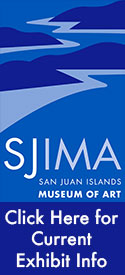Letter from San Juan Safaris
Posted November 10, 2018 at 8:30 am by Tim Dustrude
In the SJ Update mailbag this morning we have this letter to share with you from Brian Goodremont at www.sanjuansafaris.com…

Proposed Southern Resident Orca Watching Suspension Fails to Address Science- Based Issues: Save the Salmon, Save the Whales
Headlines are dominated by the proposal to suspend vessel-based viewing of Southern Resident killer whales in Washington State waters. There is much information circulating locally about what this proposal means for orcas, local educational businesses, and the Salish Sea marine ecosystem.
In March 2018, Governor Jay Inslee signed an executive order to establish immediate actions to benefit Southern Resident killer whales, and at the same time formed the Southern Resident Killer Whale Recovery Task Force to develop short and long-‐term proposals for recovery of this endangered population.
Bringing several stakeholder groups and experts into a round-‐table discussion to create recommendations for how to legislatively proceed, at its inception the task force was heralded as a potential triumph in conservation policy.
What is this Proposed Whale Watch Suspension?
This proposed recommendation from the Governor’s task force is not a ban on whale watching in Washington State.
If enacted, this proposal would suspend vessel activity around one of two ecotypes of killer whale found in Washington State waters. This proposal would only become a law if it goes through the state rule making process, and then to the desk of Governor Inslee.
Orcas of Washington State
Two distinct populations of orcas, known as Southern Resident killer whales and Bigg’s killer whales inhabit the inland waters of Washington State.
The number one difference between these populations is prey preference; Southern Residents eat exclusively salmon, while Bigg’s killer whales eat marine mammals. This proposed suspension will not limit viewing of Bigg’s killer whales, or other species found in local waters, like humpback whales, harbor porpoise, gray whales, Dall’s porpoise, and minke whales.
Details of the Proposed Suspension
In its final rendition, the recommendation contains no details to steer state enforcement officials, and no details on whether this suspension includes only commercial whale watching vessels, or additionally includes privately owned boats and commercially or privately owned human-‐powered watercraft such as kayaks and canoes.
The proposed suspension of vessel-based whale watching around Southern Residents did not undergo the same rigorous six-‐month process as all other proposals within this recovery package. Most notably, the public did not have the opportunity to participate in the political process surrounding this proposal as promised by elected officials.
There are questions about the significant breakdown in the task force processes and the extreme lack of political ethics employed to drive the discussion and hasty passage of this proposal. Overall, there is a lack of support from the public.
Respectful Whale Watching in the Salish Sea
In the last decade the Pacific Whale Watch Association worked with local whale researchers, acoustic scientists, national, state, and county government agencies, as well as other local organizations to pioneer the most safe and respectful wildlife viewing guidelines in the world.
The guidelines voluntarily put forth, and then abided by, the Pacific Whale Watch Association exceed the protections afforded to the whales by local, state, and federal laws.
The Pacific Whale Watch Association actively campaigned to enact the Be Whale Wise Guidelines, which are expounded in the industry’s Best Practice Guidelines, into state and federal law.
Individual scientific findings can disagree, but overwhelmingly the scientific body shows consensus that implementation of Go-‐Slow Zones and vessel limits, as detailed in the Be Whale Wise Guidelines as well as the updated Pacific Whale Watch Association Best Practice Guidelines, mitigate acoustic impacts of current whale watching efforts to almost zero, according to longtime researcher Dr. David Bain.
San Juan Safaris and other member companies of the Association take great pride in putting wildlife health and wellbeing first in all operations, while educating the public about important environmental issues facing the Pacific Northwest.
Refocusing on Southern Resident Killer Whale Recovery
Overwhelmingly in recent years, when eco-‐tours encounter orcas, Bigg’s killer whales have been the predominate ecotype, rather than Southern Resident killer whales.
The Bigg’s killer whale population is increasing at an astonishing 5% a year, fueled by a robust population of their preferred prey, harbor seals. Conversely, sightings of Southern Resident killer whales have been further and further apart as their preferred prey, Chinook salmon, have seen an overall decline in population and quality along the west coast.
This proposed suspension of whale watch activities is a misdirection of political and social energy from the most severe issue these whales face in their recovery: prey availability. With this proposal, this task force has added its name to an ever-‐growing list of teams, agencies, panels, and other groups who have been unable foster meaningful discussion and action for Chinook salmon recovery.
You can support the San Juan Update by doing business with our loyal advertisers, and by making a one-time contribution or a recurring donation.
Categories: Letters, Opinion, People, Wildlife
One comment:










One comment...
Really disappointed in Ranker calling this bs a “bold” step when it is the wimpiest reccomendation they could make. Wimpy in the sense that the Whale Watch industry is probably the least effective lobby compared to energy and agribiz. The whales need more food and experts have long agreed that taking down the 4 Lower Snake River dams is the only effectve way to accomplish that. Maybe if the dams came down it would make sense to limit boats of all kinds, watching and fishing, around the whales for a few years but otherwise it will not help to limit boats and not do something radical to increase the salmon population. The whales will still starve. Fishermen should be on board with this as well, as they will benifit in the long run.
By submitting a comment you grant the San Juan Update a perpetual license to reproduce your words and name/web site in attribution. Inappropriate, irrelevant and contentious comments may not be published at an admin's discretion. Your email is used for verification purposes only, it will never be shared.